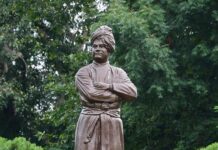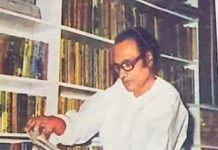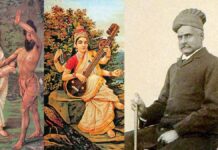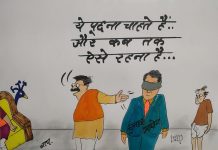— VBRINDER GROVER —
Rammanohar Lohia ruled the hearts and minds of many, the records of recent times would bear sufficient testimony to that. He inspired many to act when the going was rough, to rally when the fout seemed total, to get back repeatedly to the path of struggle, suffering and sacrifice. He even made the humble and the lowly scale heights that until then were the exclusive preserve of the prigileged few. The question that arises-do the values he cherised still have a meaningful message? And what about his philosophy of “jail, spade and vote”? On the dictum of “Con-struction and Satyagraha. Moreover, in Lohia relevant in the present day India?
But what was the exact philosophy of Dr. Lohia? Was he a socialst philosopher? Or a radical nationalist whose anger against injustice and yearning for an egalitarian way of life would not allow him to confine himself to any given label for long? Or a visionary born ahead of his time? Or was he a schemer whose only ambition was get to power and share it with nole?
It cannot be denied that Dr. Lohia was a socialist who firmly believed that socialism, if it were to lead the people to progress and prosperity must be based on the Indian conditions.
Socialism has the reputation of much interpreted and less understood term. Even in India no two thinkers agree to what exactly socialism is. Many and varied have been the influence that have shaped socialist thought in India. In the earlier period of its evolution, socialism was more or less synonymous with orthodox Marxism, offering not merely a scientific account of the historical evolution of society but a guide to revolutionary action. In this period Gandhi was derided as a reactionary hampering the process of social transformation.
During the Second World War, however, a period of rethink-ing and self-analysis set in when some of the Gandhian principles were re-examined in the light of the communist and socialist movements all over the world as also in view of the special economic problems facing India. As a result, the socialist thought came to be infleunced by Gandhian views. Lohia was the one who tried to give a new orientation of Marxist and Gandhian principle. The Lohia was greatly infleunced by Gandhi, but he was not a slavish follower of the Mahatama. He wanted the implementation of the principles of decentralisation in all aspected but rejected the Gandhian concept that at the techincal level India’s ills can be solved by the use of Charkha. He was in favour of innovative technology for fields as well as workshops. He admired the non-violent resistance forged by Gandhi and rejected armed revolution.
Speaking at the pachmarhi Session of the Socialist Party in 1952, Dr. Lohia very clearly pointed out the influences of Gandhi and Socialism in these words: “It is silly to be a Gandhian or Marxist and it is equal so to be anti-Gandhian on anti-marxist. There are priceless treasures to learn from Marx; but the learning can only be done when the frame of reference does not derive from an age or a person.” Lohia was of the view that some of the Marxist concepts like the “theory of evolution of capitalism” are inadequate. Communism though it destorys private property yet is fails to fulfil its economic aim-hence the Marxist thery is inadequate. Moreover, Lohia accepts the Marxist concept of class struggle as the dynamics of social change, but diffres from Marx on the premise that all human history is the history of class struggle.
Dr. Lohia wanted, like Marx, to give firm foundation to the theory of socialism by chalking out a programme of action for the realisation of the final goal. This can be done by bringing about a comprehensive, seven-fold revolution through three instru ments-Jail, spade and vote. According to Lohia, the choice for the socialists is not between the ballot and the bullet, between parliament and insurrection, as is generally believed: it is between “Satyagraha” and the “bullet”. The ballot undoubtedly has its place but when injustice and opression assume unbearable propor-tions, the only course left open to justice-loving people is to take recourse to the matchless remedy of civil disobedience.
According to Lohia Asian socialism cannot be gradual; it will have to be drastic and unconstitutional, though peaceful. To achieve this type of socialism Lohia recommends “seven-fold” revolution consisting of procedural revolution, revolution against inequalities, revolt of the subject people all over the world against their unjust rulers, revolt of the poor against the rich, revolution aiming at protecting the privacy of the individual against encroach-ment by the collective State and the revolution against the indiscrimate use of war weapons. This Revolution, according to Lohia, must combine the twin principles of sympathy for all and anger against injustice.
In the evolution of the socialist movement and the elaboration of the socialist though in India, Dr. Rammanohar Lohia occupied a unique place. His contribution to the socialist movement was outstanding. He was the first socialist thinker in India who refused to have his mental horizon limited by the ideas drawn from the Soviet Union or from the West. His socialism was a product of the soil. He knew that the socialism of the text-books was beyond the comprehension of the common man in India, as he is shrouded in superstitions, obsolete customs; poerty and ignorance. Therefore, he sought to work out his ideas in consonance with these conditions. Dr. Lohia dreamt socialism in the form of a new socialist civilisation which would be free from all types of exploitation-social, political and economic.
Political philosophy has no meaning, if it does not take into consideration the people and their problems. Dr. Lohia took into consideration complex socio-economic problems of India and on these grounds enunciated his political ideas. Dr. Lohia can be distinguished from other political leaders for his dynamic and uninhibted approach to the various problems. Freedom in thought and experimentation was that he cherished most. That is Lohia’s most valuable gift to the socialists in India
Discover more from समता मार्ग
Subscribe to get the latest posts sent to your email.
















